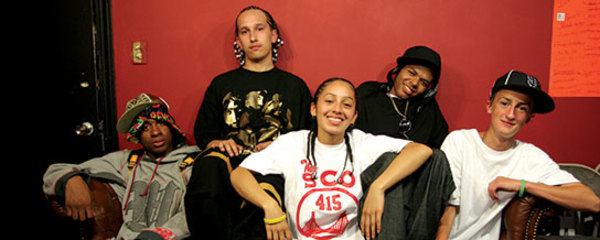The DJ Project: Beats and Business
Six-foot-seven Jeff Feinman looks he should be on the basketball court teaching kids to drive […]
The DJ Project: Beats and Business
Six-foot-seven Jeff Feinman looks he should be on the basketball court teaching kids to drive […]

Six-foot-seven Jeff Feinman looks he should be on the basketball court teaching kids to drive the lane and dunk instead of programming beats. But since 2000, geared up in b-boy baggy jeans and tilted Kangol hat, Feinman has been sequestered in the basement of Horizons Unlimited (located at 440 Potrero Street in San Francisco’s Mission district), guiding youth to fulfill their music dreams.
It sounds almost too good to be true: The DJ Project is a free music studio available to low-income teens kids and young adults five days a week. During their quarterly 12-week-long cycles, program founder Feinman and graduates of the program teach young men and women how to use music programs like Reason, ProTools and Peak, as well as record vocals in a sound booth. Additionally, students learn DJ skills, write business proposals to fund CDs and explore the legal aspects of a career in music.
“It’s an after-school arts program related to hip-hop culture,” explains Feinman. “[The kids] work start to finish, from conceptualization to the finished project, learning how to sell records and the business in the process. We also teach kids how to work collaboratively, how to present yourself; we do professional development and performance training.”
SF City Hall and other community groups have commended the DJ Project for its professional approach and success at keeping kids away from gang activity. The students themselves live anywhere from just down the block to public housing projects, group homes and homeless shelters. Five years and counting, the Project has expanded to four Bay Area facilities-two in San Francisco, two in Oakland. The latter two programs have played a role in diffusing the territorialism and violence between different Oakland ‘hoods.
“We get everyone,” says Feinman, “from gangbangers who want to turn their life around and rap about their transformation to thugs and bling-bling kids to backpackers and nerdy beatmakers who never come out of their rooms but want to interact with other kids.” Serving mainly youth 15-26 years of age, Feinman also makes it clear he’s trying to reach out especially to women, in order to “make a safe space for them to come and create.”
On a typical day, program graduate Juan Guillermo, 21, is helping overdub Young Mic’s (Michael Arevalo) hip-hop track using ProTools. The excited MC rushes in and out of the vocal booth barking commands like a seasoned vet to his fellow student engineers: “Turn up the volume! I can’t hear myself. I gotta get this down right!” A few feet away, in front of a glowing eMac, Jabulani, 18, puts the finishing touches on a beat he just made, as fellow students practice freestyle rhymes aloud and make comments on the productions at hand. It gets sweaty and claustrophobic in the 10 x 20 foot low-ceilinged studio, but it’s the kind of controlled, directed creative flow that’s allowed graduates to produce no less than 15 CDs worth of original tracks in five years.
While the DJ Project’s output is strong, the equipment takes a beating. Oxygen8 keyboards and headphones constantly need replacing, the eMacs need upgrades and there are never enough scratch cartridges. But the kids also learn that it’s up to them to attract their own investment capitol.
“Currently we’re incubating a CD and DVD-duplication business, and we’re going to launch that in January,” says Feinman of their expanding projects. “We’re writing business plans, learning about targeted markets and competitive advantages and writing PowerPoint presentations. I’m into the whole hip-hop entrepreneurism, so I’m also looking for spin-off businesses that don’t require a lot of start-up capitol; [things] that are fairly easy to run yet are related to music.”
Bay Area artists including DJ Zeph, Azeem, DJ Quest, Zion-I, J-Boogie and Blackalicious have come through to give talks. The artists have sparked the students’ interest in learning about the business of recording careers.
Feinman envisions internships as a means of giving his graduates other insights into the music business as a whole. “I want these kids to get internships at a studio, at a label, a magazine, a radio station, so they’re exposed to other things other than just being behind the mic.” But he’s realistic about what the DJ Project can achieve in the long run. “I”m not saying we can necessarily increase their job prospects, but we connect them to something positive.”

